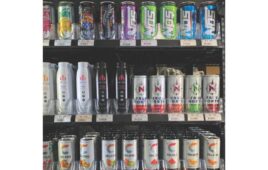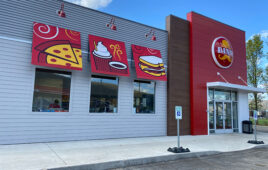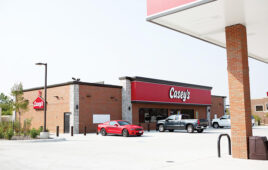 Colonial Group, the parent company of Savannah, Ga.-based Enmarket convenience stores, is celebrating its 100th anniversary. The company’s longevity is a testament to its ability to recognize and adapt to industry shifts across a century that has seen dynamic evolution in the convenience and petroleum industry.
Colonial Group, the parent company of Savannah, Ga.-based Enmarket convenience stores, is celebrating its 100th anniversary. The company’s longevity is a testament to its ability to recognize and adapt to industry shifts across a century that has seen dynamic evolution in the convenience and petroleum industry.
Today, Enmarket is growing through new builds and acquisitions, while remodeling existing locations. It currently operates 129 locations in Georgia, South Carolina and North Carolina, sells Enmarket-branded fuel and features 23 in-bay automatic car washes and one express tunnel wash. The chain is finalizing the latest iteration of its prototype store design, expanding its The Eatery proprietary foodservice program across its fleet of stores and investing in technology — from a loyalty program that launched in 2020 to frictionless checkout and electric vehicle (EV) charging.
Brett Giesick, president of Enmarket, pointed to entrepreneurial vision and spirit as the keys behind the long-term success of Colonial Group and its Enmarket convenience store division.
“I believe our retail division is aligned with the culture of our parent company in that we take calculated risks, understand the need for ongoing investments of time and capital in our people and business,” Giesick said. “But most importantly, our mantra of ‘enriching life’ encourages us to do the right things for our team members and communities. What we do is for the longer-term betterment of all, not just short-term results.”
That entrepreneurial vision is led by Colonial Group President and CEO Christian Demere, who represents the fourth generation of the family business.

“I feel humbled to have the privilege to be a part of such an incredible legacy,” said Christian Demere.
When reflecting on the last 100 years, he noted his first thought is a deep sense of gratitude for the sacrifice and effort by not only the family, but also the dedicated employees that helped bring the company to where it stands today, which inspires in him a desire to put his all into growing the business and making it stronger.
“While I think I am naturally a very driven person, I think the 100-year legacy that I am now a part of, and ultimately responsible for, is a huge factor in my drive and passion,” he said.
History in the Making
Colonial Group’s roots date back to 1921. Founder Raymond Demere had returned from World War I and saw an opportunity to supply fuel for vehicles that were now powered by internal combustion engines as opposed to horses. He purchased a 55-gallon barrel of oil and founded Savannah’s first independent wholesale petroleum company, American Oil Co., on July 21, 1921.
Two years later, he debuted his first American Oil Co. service station located on the corner of Drayton and Charlton in Savannah. Ten years after that, in 1933, Raymond Demere sold the name American Oil Co. to Standard Oil Co. of Indiana. He renamed the company Colonial Oil and moved it to a 21-acre parcel of land on the Savannah River, which remains the company headquarters today.
In 1926, he hired Charles Jarrell, who had been an office manager with the National Cash Register Co. Jarrell served as an officer and director of American Oil and Colonial Oil. When Raymond Demere passed away in 1953, Jarrell took the helm as president, with a goal of providing a sense of continuity, while carrying the company forward until the second generation of the family business obtained the experience needed to steer the company. That day came five years later in 1958, when the founder’s son, Robert Demere Sr., stepped into the role of president. Jarrell continued to serve the company, including as chairman of the board, until he retired in 1974.

Under Robert Demere Sr.’s leadership, the convenience store division, ‘Interstate Stations,’ was founded in 1964.
His son, the third generation of the family business, Robert Demere Jr., became president in 1986. The c-store chain, which at the time featured a 200-square-foot kiosk model, was rebranded as Enmark in 1990, which stood for “energy marketing.” The rebrand included a prototype design that measured 3,500-4,000 square feet, featuring a new look and colors, in an effort to grow customer loyalty and position the chain as a leader in the gasoline retail market.
From the 1990s to the 2000s, the brand changed with the times, transitioning away from a store model based on fuel and tobacco sales, to one that centered fresh food, healthy snacks and beverage offerings.
With this new in-store strategy in place, the company’s leadership decided the time was right to update the brand to better align with its modern product offering. In 2015, the company rebranded its convenience stores to Enmarket, strategically keeping the word “Enmark” within the name to maintain brand awareness through the transition.

The third and fourth generations of family-owned Colonial Group leadership include Houstoun Demere, Savannah Yacht Center vice president; Robert Demere Jr., Colonial Group chairman of the board; and Christian Demere, Colonial Group president & CEO.
“With the simple addition of two letters, we’ve included the word ‘market’ within our name, and that is more indicative of the type of stores we operate,” fourth-generation executive Houstoun Demere said at the time.
Robert Demere Jr. also led the expansion of the Colonial Group beyond the c-stores, developing the business into one of America’s largest privately held companies with nine subsidiaries, which include Colonial Oil Industries Inc., Colonial Terminals Inc., Enmarket, Colonial Compliance Systems Inc., Colonial Energy Inc., Colonial Chemical Solutions Inc., Colonial Towing Inc., and Savannah Yacht Center and Aqua Smart Inc.

Raymond Demere
Today, both of his sons, Christian and Houstoun, are continuing the company’s legacy as fourth-generation leaders. Robert Demere Jr. remains involved with the company as chairman of the board of directors.
Colonial Group opened the Savannah Yacht Center, a superyacht facility, which was incorporated as an entity of Colonial Group in 2016. Houstoun Demere became vice president of business development for the new startup, which opened in 2017. And in 2018, Christian Demere took the helm of Colonial Group as president and CEO.
Expanding Enmarket
Industry veteran Brett Giesick joined Enmarket as president of the c-store division in 2017, after serving as chief retail officer of CEFCO convenience stores.
As Enmarket looks toward the future, it is growing through new-to-industry (NTI) builds as well as acquisitions, with a goal to build between five to 10 NTI stores per year.
To accommodate its growth, in 2019, Enmarket relocated the c-store division headquarters to the corner of Chatham Parkway and Highway 17 in Savannah, Ga., which includes two 23,000-square-foot buildings.
The chain’s latest prototype design measures just under 6,000 square feet and debuted in March 2020 at 4318 Ogeechee Road in Savannah, next door to the chain’s headquarters. The new site featured the company’s first Marketwash+ — an 80-foot tunnel wash.
At the time, Giesick noted, “We wanted a clean, modern design that accommodates the multiple roles of an Enmarket store — a fueling station, a deep convenience inventory, appealing and healthy prepared food options, and a modern, state-of-the-art car wash.”

The chain debuted two additional new-to-industry sites in 2020, around Chatham County, Ga. — a growing commercial area around U.S. Highway 17 and Chatham Parkway. In early 2021 it introduced its 128th location — a travel center in Pooler, Ga. — marking its fourth site in the west Chatham municipality. And in April, it introduced its 129th site in Jesup, Ga. All four locations are iterations of the modern prototype.
Under Giesick’s leadership, Enmarket has more than doubled its store count and number of team members over the past four years.
“Our top and bottom lines have dramatically improved, as have our internal processes,” Giesick said. “We have also re-imaged all of our stores into the awesome look we enjoy today and have improved our food and other product offerings. Our team has worked tirelessly to drive improvements in how we appeal to our customers, and this continues today.
“From a leadership perspective, most of the key leaders that predate me are still here, and I continue to be impressed with their talent and commitment,” he added. “Because of growth, we have augmented our leadership team with several new team members that support the company in various capacities.”
For example, Enmarket has added “multiple layers” to its operations team to support the stores it has added through new builds and acquisitions over the past three to four years. “Our foodservice team has grown with new director-level positions and several operations and quality assurance roles. We’ve also added positions within the marketing, finance and IT departments,” Giesick said.
Currently, Enmarket is finishing plans for a smaller version of the current prototype store. “The look of the store is consistent with the existing prototype, as are the store offerings inside,” Giesick said. “But we’ve trimmed out over 1,000 square feet, which helps take some cost out of the build, saves construction time and yields a store that is more efficient to operate. These smaller and larger versions will be used site specifically, and we have several other modified designs for future needs.”
Foodservice Evolution
In the early 2000s, the chain — then called Enmark — took its first steps into foodservice, adding the American sub sandwich quick-service restaurant (QSR) Blimpie to its Port Wentworth, Ga., location. In 2011, the company shifted to a focus on fried chicken and hot foods through the Krispy Krunchy Chicken brand.
With the shift to the Enmarket branding, the chain announced its ‘The Eatery’ proprietary food program featuring fresh prepared foods, such as burritos, sandwiches, salads, rotisserie chicken and more, made to order and available via touchscreen ordering.
Enmarket hired c-store foodservice veteran Ryan Krebs as its director of food and beverage at the start of 2020 to continue to grow its foodservice operation to the next level. Today, The Eatery features breakfast, lunch and dinner options, as well as Mooz frozen yogurt and Enmarket’s bean-to-cup coffee. Grab-and-go items are prepared fresh daily in the stores and include items such as breakfast biscuit sandwiches, salads, hot and cold sandwiches, and fruit cups.

Enmarket also operates 14 QSRs, including Subway, Larry’s Giant Subs and Baldinos Giant Jersey Subs, as well as fast-casual brand Fuzzy’s Taco Shop.
“We are also focused on expanding our foodservice program to as many stores as possible via an ongoing current rollout,” Giesick said.
Tech Savvy
The chain is also doubling down on technology.
Enmarket launched a new loyalty program, Enjoy Rewards, in early 2020, through which customers can earn fuel discounts by purchasing gasoline, diesel or food and merchandise in-store. The loyalty program also includes club programs, such as for coffee and frozen beverages, where customers can get an item free after six purchases.
Enmarket also relaunched its new-and-improved mobile app earlier this year.
“Within the mobile app you’ll find technologies such as Skip Checkout, which allows customers to scan and pay for merchandise right from their phone,” Giesick noted. “Another new integration in the mobile app is cardless payment, both at the fuel dispenser and inside the store.”
 Today, all new builds feature self-checkout registers, and the chain plans to roll out self-checkout kiosks to existing legacy locations as well.
Today, all new builds feature self-checkout registers, and the chain plans to roll out self-checkout kiosks to existing legacy locations as well.
Enmarket is also delving into electric-vehicle (EV) charging. Its first EV charging station was installed at a NTI Enmarket location in Pooler, Ga., a few years ago, and since then, EV chargers have been added to three other stores.
“Each new site is evaluated as a potential site for EV,” Giesick said. “We are also assessing existing sites with Georgia Power to determine immediate and future viability at stores we currently operate.”
Overall, Enmaket remains focused on servicing its customers and getting them in and out of the stores as quickly as possible with help from technology, Giesick said.
“Time is the most precious resource any of us have, and that’s the value proposition we offer our customers,” he said. “So technology is a huge focus for us today as the primary source of time-saving solutions. This includes current initiatives like self-checkout, mobile checkout and mobile pay-at-the-pump. We are working on curbside pickup and delivery.”
“Additionally, we are focused on how to continue to evolve how we serve our communities and team members in the best way possible as the business and culture change,” Giesick added.
Future Vision
As Colonial Group looks ahead to the next 100 years, it’s continuing to evaluate and adapt its operating practices for a new tomorrow.
“While continued growth of (NTI stores) and smart acquisitions are important, continuing to develop a better box to operate within is just as critical,” Giesick said. “This encompasses everything from training to products, marketing, foodservice, technology, customer-facing initiatives, standards and many other internal processes that are ongoing, in an attempt to strengthen our operations within said box.”
From a macro viewpoint, Christian Demere sees that the world is changing for the petroleum industry. “How quickly that change will occur, what it will look like and how exactly it impacts us are all still unknowns,” he said.
When the company was founded, petroleum was being introduced as “the lifeblood of our economy,” he said. “As a result, for most of Colonial’s history, petroleum was seen as a force of stability for the company.”

But today, petroleum is no longer the defining element of Colonial’s business. “It’s just a big part of what we handle. Our core competencies today are really intermodal logistics and distribution — and being extremely nimble.”
Eight of the nine subsidiaries that make up Colonial today involve logistics and distribution, while only three are solely dependent on logistics and distribution of petroleum products. “So we are not as petroleum-dependent as many people might think,” he said. “I see us continuing to leverage these competencies in other industries as we move forward as well as continue to develop new competencies where it makes sense.”
Looking forward, Christian Demere expects the rate of change impacting the industry to accelerate, and he’s continuing to craft a dynamic culture that embraces transformation. To him, the “real magic” at Colonial has always been its people, which includes generations of other families that have worked for the company over the years. As a result, he takes the mission of sustaining the company culture seriously, even if that means prioritizing it over rapid growth at times.
“The bottom line in all of this is that we’ve got to stay nimble. That quality is what has allowed us to endure and pivot for the first 100 years, and it will be critical if we want to be around for another 100 years,” Christian Demere said. He pointed to the shifts in the c-store industry over the last century, particularly the transition from being predominantly fuel-driven to foodservice-centric.
“We’re in the midst of another potential paradigm shift towards EVs. So hopefully we’ll be able to adapt yet again,” Christian Demere said. “And that’s really business in general — constant destruction of equilibriums and being able to foresee and/or react quickly as needed.”




